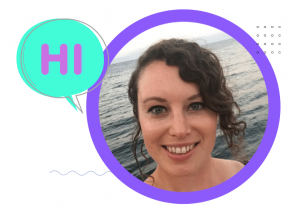Lizzie Davey On Building A Successful Freelance Business
Setting up a freelance business is not easy.

There are a lot of moving parts and as the sole owner of this business, it’s your job to ensure that everything moves smoothly. All this can get too overwhelming too fast.
 To help upcoming freelancers better organize their business and navigate the world of being their own boss, we spoke with Lizzie Davey.
To help upcoming freelancers better organize their business and navigate the world of being their own boss, we spoke with Lizzie Davey.
She is a freelance writer and strategist for B2B SaaS and eCommerce brands.
In this interview, she talks about how she started freelancing, the challenges she had to face, and her learnings along the way.
Let’s dive in!
1. Did you have a full-time job in the past? What was it like?
Yes, I’ve had two full-time jobs in the past: Marketing Assistant for a travel company and Community Manager for a video production company.
I learned a lot at both jobs – the biggest lesson was definitely learning to juggle different activities and plan my workload throughout the week.
With marketing jobs, there’s an endless to-do list, so it’s important to plan and prep to make sure you get everything done.
That being said, I always hated working for someone else and I constantly imagined bigger and better things for myself.
There were also parts of those full-time jobs that I didn’t enjoy, so when I went freelance I made sure I focused on the bits I did enjoy!
2. How did you get into freelance? Did you have enough clients to start with?
Going freelance was a bit of a spontaneous decision for me. I knew I wanted to work for myself at some point, but I didn’t think it would be at 23 years old.
My partner at the time had just landed a job in Spain and, if I wanted to go with him, I had to think about how I could generate money.
I had zero clients to start with, but my old job hired me to do some freelance work for them and I started to pick up clients through my network pretty quickly.
It helped that I’d been a part of the blogging world for a couple of years, so I already had a kind of built-in portfolio and some professional experience under my belt.
3. What is the key difference between a good freelance writer and a great freelance writer?
I think a lot of freelance writers get caught up in the “writing” part. And while, yes, writing is a huge part of the job (and you have to be able to string a decent sentence together!), the greatest freelance writers are able to run a business.
They are good at pitching themselves, positioning themselves, and working professionally.
That means delivering work on time, doing what you say you can, and generally being a reliable person (it’s amazing the number of times clients have said they’ve struggled to find a reliable freelancer!).
4. How important is it to build a website for someone who wants to become a freelancer?
This is a controversial question because I know plenty of successful freelancers who don’t have a website at all.
However, I think if you’re just starting out and have a relatively small network, it can help to have a website that positions your services, explains a bit about you, and acts as a place to direct potential clients to.
My website has actually been a huge part of my business.
The majority of my leads are from search traffic because I’ve niched my website to attract the kinds of clients I want to work with.
5. What are the three things one should do when going full-time freelance?
I don’t think I’d recommend anyone do what I did where I quit my job and went freelance in a month with no clients on the side.
It was scary, but if you have a financial cushion it can give you the kick you need to get started.
So, that’s one thing – have a financial cushion. I think I’d saved up at least six months’ worth of living expenses in case I couldn’t find any work.
Secondly, I would reach out to my network and let family, friends, and colleagues know that I’m taking on freelance work and hook me up with any possible opportunities.
Finally, I would work on my offer and choose a service to focus on. I’d create a page dedicated to it on my site so I can start shopping it around in pitches.
6. What has been the hardest challenge for you in building your freelance career?
The hardest part has definitely been trying to focus and see the bigger picture. In the early days, it’s really easy to say yes to everything because you don’t know when the work is going to dry up.
Then you get stuck in this cycle of doing little jobs that you don’t enjoy without leaving yourself any time to work on the big stuff and look at what your plan is for the long-game.
All of a sudden, it’s three years later and you’re still doing the same thing!
7. What’s your secret passion?
I don’t know if this is particularly secret, but I’m very passionate about helping young women realize their potential as business owners.
I’m a mentor for a great organization that encourages teenage girls to start thinking about their future and help them build their confidence in a professional setting.
I’m hoping to do more of this kind of stuff moving forwards.